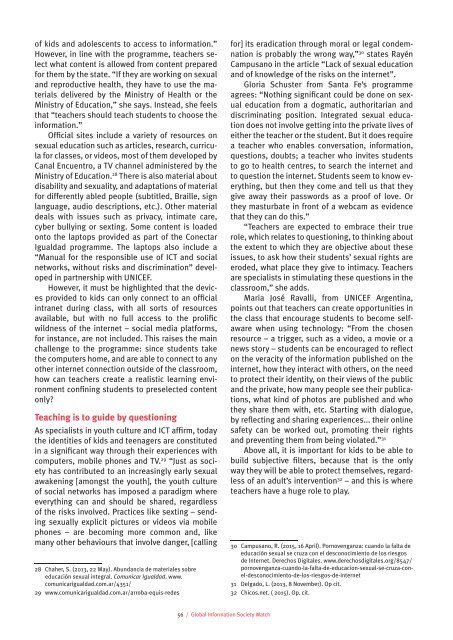Global Information Society Watch 2015
gw2015-full-report
gw2015-full-report
Create successful ePaper yourself
Turn your PDF publications into a flip-book with our unique Google optimized e-Paper software.
of kids and adolescents to access to information.”<br />
However, in line with the programme, teachers select<br />
what content is allowed from content prepared<br />
for them by the state. “If they are working on sexual<br />
and reproductive health, they have to use the materials<br />
delivered by the Ministry of Health or the<br />
Ministry of Education,” she says. Instead, she feels<br />
that “teachers should teach students to choose the<br />
information.”<br />
Official sites include a variety of resources on<br />
sexual education such as articles, research, curricula<br />
for classes, or videos, most of them developed by<br />
Canal Encuentro, a TV channel administered by the<br />
Ministry of Education. 28 There is also material about<br />
disability and sexuality, and adaptations of material<br />
for differently abled people (subtitled, Braille, sign<br />
language, audio descriptions, etc.). Other material<br />
deals with issues such as privacy, intimate care,<br />
cyber bullying or sexting. Some content is loaded<br />
onto the laptops provided as part of the Conectar<br />
Igualdad programme. The laptops also include a<br />
“Manual for the responsible use of ICT and social<br />
networks, without risks and discrimination” developed<br />
in partnership with UNICEF.<br />
However, it must be highlighted that the devices<br />
provided to kids can only connect to an official<br />
intranet during class, with all sorts of resources<br />
available, but with no full access to the prolific<br />
wildness of the internet – social media platforms,<br />
for instance, are not included. This raises the main<br />
challenge to the programme: since students take<br />
the computers home, and are able to connect to any<br />
other internet connection outside of the classroom,<br />
how can teachers create a realistic learning environment<br />
confining students to preselected content<br />
only?<br />
Teaching is to guide by questioning<br />
As specialists in youth culture and ICT affirm, today<br />
the identities of kids and teenagers are constituted<br />
in a significant way through their experiences with<br />
computers, mobile phones and TV. 29 “Just as society<br />
has contributed to an increasingly early sexual<br />
awakening [amongst the youth], the youth culture<br />
of social networks has imposed a paradigm where<br />
everything can and should be shared, regardless<br />
of the risks involved. Practices like sexting – sending<br />
sexually explicit pictures or videos via mobile<br />
phones – are becoming more common and, like<br />
many other behaviours that involve danger, [calling<br />
28 Chaher, S. (2013, 22 May). Abundancia de materiales sobre<br />
educación sexual integral. Comunicar Igualdad. www.<br />
comunicarigualdad.com.ar/4351/<br />
29 www.comunicarigualdad.com.ar/arroba-equis-redes<br />
for] its eradication through moral or legal condemnation<br />
is probably the wrong way,” 30 states Rayén<br />
Campusano in the article “Lack of sexual education<br />
and of knowledge of the risks on the internet”.<br />
Gloria Schuster from Santa Fe’s programme<br />
agrees: “Nothing significant could be done on sexual<br />
education from a dogmatic, authoritarian and<br />
discriminating position. Integrated sexual education<br />
does not involve getting into the private lives of<br />
either the teacher or the student. But it does require<br />
a teacher who enables conversation, information,<br />
questions, doubts; a teacher who invites students<br />
to go to health centres, to search the internet and<br />
to question the internet. Students seem to know everything,<br />
but then they come and tell us that they<br />
give away their passwords as a proof of love. Or<br />
they masturbate in front of a webcam as evidence<br />
that they can do this.”<br />
“Teachers are expected to embrace their true<br />
role, which relates to questioning, to thinking about<br />
the extent to which they are objective about these<br />
issues, to ask how their students’ sexual rights are<br />
eroded, what place they give to intimacy. Teachers<br />
are specialists in stimulating these questions in the<br />
classroom,” she adds.<br />
Maria José Ravalli, from UNICEF Argentina,<br />
points out that teachers can create opportunities in<br />
the class that encourage students to become selfaware<br />
when using technology: “From the chosen<br />
resource – a trigger, such as a video, a movie or a<br />
news story – students can be encouraged to reflect<br />
on the veracity of the information published on the<br />
internet, how they interact with others, on the need<br />
to protect their identity, on their views of the public<br />
and the private, how many people see their publications,<br />
what kind of photos are published and who<br />
they share them with, etc. Starting with dialogue,<br />
by reflecting and sharing experiences... their online<br />
safety can be worked out, promoting their rights<br />
and preventing them from being violated.” 31<br />
Above all, it is important for kids to be able to<br />
build subjective filters, because that is the only<br />
way they will be able to protect themselves, regardless<br />
of an adult’s intervention 32 – and this is where<br />
teachers have a huge role to play.<br />
30 Campusano, R. (<strong>2015</strong>, 16 April). Pornovenganza: cuando la falta de<br />
educación sexual se cruza con el desconocimiento de los riesgos<br />
de Internet. Derechos Digitales. www.derechosdigitales.org/8547/<br />
pornovenganza-cuando-la-falta-de-educacion-sexual-se-cruza-conel-desconocimiento-de-los-riesgos-de-internet<br />
31 Delgado, L. (2013, 8 November). Op cit.<br />
32 Chicos.net. ( <strong>2015</strong>). Op. cit.<br />
56 / <strong>Global</strong> <strong>Information</strong> <strong>Society</strong> <strong>Watch</strong>


